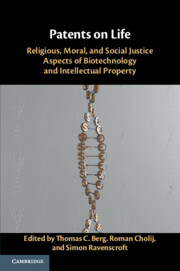 Patents on Life
Patents on Life from III - Social Justice and Political Aspects
Published online by Cambridge University Press: 28 September 2019
The chapter discusses the relationship between patent governance, ethics, and democracy, referring to limits in patent law set in democratic decisions by the EU legislator in the EU Biotech Directive. The ordre public clauses in Articles 5 and 6 attempt to "upstream" ethics and anticipatory impact assessment in biotechnology patent law. However, the interpretation of these clauses, especially for inventions concerning human embryonic stem cells, gametes, parthenotes, and genome editing (CRISPR-Cas) techniques, has ignited intense policy debates. Granting practices and case law of the European Patent Office (EPO) and its Boards of Appeal have circumvented some of these legal restrictions, and thus pose challenges for transparency and accountability norms in patent practice. Case law of the Court of Justice of the European Union (CJEU) and empirical analyses of patent application and granting practices are scrutinised. The chapter states that interpretation of legal statutes must not be narrowly literal but must also include the history and purpose of the Biotech Directive and the socio-technical and economic implications of its application. This requires that the EPO and the European Commission act transparently and account for their application of the legal rules as set by the European legislator and interpreted by the CJEU.
To save this book to your Kindle, first ensure [email protected] is added to your Approved Personal Document E-mail List under your Personal Document Settings on the Manage Your Content and Devices page of your Amazon account. Then enter the ‘name’ part of your Kindle email address below. Find out more about saving to your Kindle.
Note you can select to save to either the @free.kindle.com or @kindle.com variations. ‘@free.kindle.com’ emails are free but can only be saved to your device when it is connected to wi-fi. ‘@kindle.com’ emails can be delivered even when you are not connected to wi-fi, but note that service fees apply.
Find out more about the Kindle Personal Document Service.
To save content items to your account, please confirm that you agree to abide by our usage policies. If this is the first time you use this feature, you will be asked to authorise Cambridge Core to connect with your account. Find out more about saving content to Dropbox.
To save content items to your account, please confirm that you agree to abide by our usage policies. If this is the first time you use this feature, you will be asked to authorise Cambridge Core to connect with your account. Find out more about saving content to Google Drive.